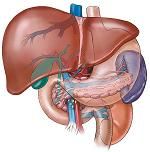Surgery May Be the Answer for Drug-Induced Gallbladder Disease
Although molecularly targeted cancer therapies are generally safe and more effective than previous treatment options, some serious adverse events can occur.

The US Food and Drug Administration (FDA) has approved a number of molecularly targeted cancer therapies (MTT) over the last few years, and many are in the drug development pipeline for common cancers.
Although these targeted agents are generally safe and more effective than previous treatment options, some serious adverse events can occur. For example, antivascular endothelial growth factor antibodies like bevacizumab, tyrosine kinase inhibitors like sunitinib and sorafenib, and mammalian target of rapamycin (m-TOR) inhibitors like everolimus have all been associated with serious gastrointestinal (GI) side effects.
MTT has also been associated with acute cholecystitis, although it occurs more rarely. Nevertheless, untreated acute cholecystitis can lead to perforation, abscess formation, systemic sepsis, and potentially life-threatening gangrenous changes. Additionally, radiologists may be unfamiliar with cholecystitis secondary to MTT, and its clinical impact has been minimally evaluated.
A team of researchers from Boston’s largest tertiary oncology center recently published a review of MTT’s clinical and imaging features in the January-February 2014 issue of Clinical Imaging. They reviewed 6 cases of drug-induced gallbladder pathology, of which one case was related to sorafenib, 2 to sunitinb, 2 to bevacizumab, and another to everolimus. Ultimately, 3 patients required cholecystectomy.
The researchers reported MTT-induced gallbladder changes may not cause clear clinical or biochemical changes, necessitating imaging for definitive diagnosis. In their 6-patient sample, 4 patients presented with clinical symptoms of cholecystitis, but they had only marginally elevated liver function tests.
How MTT affects the gallbladder remains unclear. Antiangiogenisis disposes patients to vascular complications like thrombotic events, hypertension, and hemorrhage. Arteriolar thrombosis in the gallbladder may cause ischemia and acalculous cholecystitis, though this is only a hypothesis.
In all 6 patients, the attending oncologist discontinued the MTT and prescribed antibiotics. Though all of the patients improved, one was rechallenged with the suspect MTT, while another developed an episode of acute cholecystitis that led to cholecystectomy. Since MTTs may be a patient’s best chance at cured cancer if they can generate a response and shrink the tumor, clinicians should discuss the risks and benefits of drug rechallenge with their patients.
